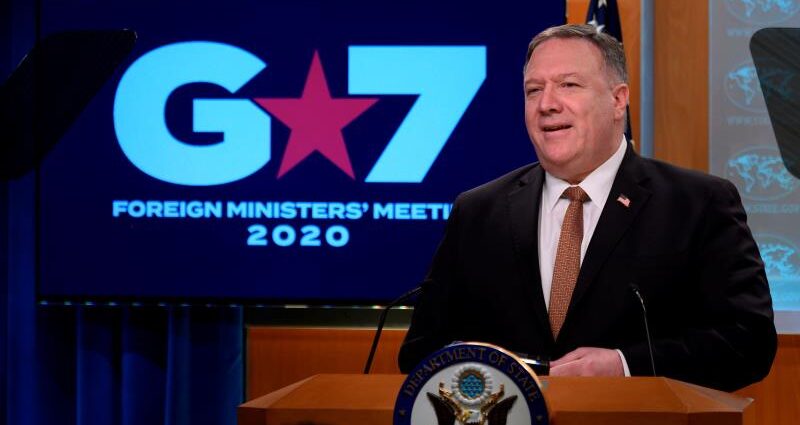Foreign ministers representing seven major industrialized nations failed to agree on a joint statement Wednesday after the Trump administration insisted on referring to the coronavirus outbreak as the “Wuhan virus,” three officials from G-7 countries told The Washington Post.
Other nations in the group of world powers rejected the term because they viewed it as needlessly divisive at a time when international cooperation is required to slow the global pandemic and deal with the scarcity of medical supplies, officials said.
Subscribe to the Post Most newsletter: Today’s most popular stories on The Washington Post
Secretary of State Mike Pompeo has brushed off criticism of his use of the term, saying it’s important to point out that the virus came from the Chinese city of Wuhan and that China’s government had a special responsibility to warn the world about its dangers.
When asked about a report that his insistence on including the term caused a rift at the Group of Seven meeting, Pompeo did not deny the charge but said that any disagreements among the group were tactical and not sweeping in nature.
“Make no mistake about it, everyone in that meeting this morning was very focused on making sure that we not only solve the health crisis associated with the Wuhan virus but also the economic challenges that face the globe as we confront it as well,” Pompeo told reporters at the State Department.
The Centers for Disease Control and Prevention and the World Health Organization have discouraged referring to the novel coronavirus by a geographical denomination amid concerns such terms are correlated with a rise in discrimination and targeted violence against Asian Americans.
President Trump and some Republican lawmakers have referred to the outbreak as the “China virus.”
Pompeo, in his remarks on Wednesday, doubled down on his criticism of Beijing.
“We tried, you’ll remember, from the opening days to get our scientists, our experts on the ground there so that we could begin to assist in the global response to what began there in China, but we weren’t able to do that. The Chinese Communist Party wouldn’t permit that to happen,” he said.
“The Chinese Communist Party poses a substantial threat to our health and way of life, as the Wuhan virus outbreak clearly has demonstrated,” Pompeo added.
One European official, who like others spoke on the condition of anonymity to discuss sensitive negotiations, said there were multiple disagreements among the G-7 members Wednesday but acknowledged “Wuhan virus” posed the most significant obstacle. Besides viewing the term as inappropriate, some officials noted that experts could not say with absolute certainty that the virus came from Wuhan until further research is conducted.
When asked about the disagreement, a State Department spokesperson noted that the group of nations issued a joint statement on March 16 concerning the pandemic.
Washington’s insistence on using the term “Wuhan virus” was first reported by Der Spiegel.
The G-7 meeting was originally scheduled to be held in Pittsburg, but organizers switched to video conference due to the spread of the outbreak, which has resulted in more than 435,000 infections and more than 20,000 deaths worldwide.
john.hudson@washpost.com
souad.mekhennet@washpost.com
 © Andrew Caballero-Reynolds/Afp Via Getty Images Secretary of State Mike Pompeo speaks at the State Department on March 25 after a G-7 video conference.
© Andrew Caballero-Reynolds/Afp Via Getty Images Secretary of State Mike Pompeo speaks at the State Department on March 25 after a G-7 video conference.

